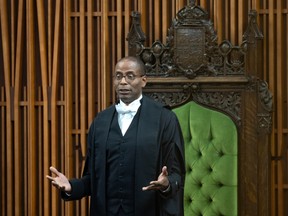Fergus’ ruling was celebrated by opposition parties, but Government House leader Karina Gould said it set a ‘terrible precedent’

OTTAWA — House Speaker Greg Fergus ruled that the government appears to have violated the vast powers of the Commons when it failed to surrender records on the so-called “green slush fund” so they could be turned over to the RCMP, even though the force doesn’t want them.
The Speaker’s ruling is the latest in the “unusual, novel and unprecedented” battle between MPs and the Liberal government over the extent of parliamentary privilege over thousands of unredacted records regarding Sustainable Development Technology Canada (SDTC), the government green fund that was plagued by scandal before being ordered shut down earlier this year. What is unusual is that MPs wanted the documents to share with a third party, namely the RCMP.
“The House has the undoubted right to order the production of any and all documents from any entity or individual it deems necessary to carry out its duties,” Fergus told the Commons Thursday evening.
“The House has clearly ordered the production of certain documents, and that order has clearly not been fully complied with. He said he “cannot come to any other conclusion but to find that a prima facie question of privilege has been established,” Fergus added.
Fergus’s ruling was celebrated by opposition parties, whereas government House leader Karina Gould said it set a “terrible precedent.”
The Speaker’s ruling was a first answer to a debate between the House of Commons and the Liberal government since the summer.
At issue is whether Parliament use its vast constitutional powers to compel the production of documents simply to pass them on to the RCMP, particularly when the RCMP told MPs this summer that it is “highly unlikely” that it could use any of the documents for an eventual criminal investigation.
“It is indeed unusual, novel and unprecedented for the House to order documents not for its own purposes but for a third party,” Fergus said.
Now it is up to the House of Commons to decide next steps. At Fergus’s suggestion, MPs spent Friday debating a motion that would send the issue to further study by the Commons procedure committee.
But the issue could also land in court if the government decides to ask a judge to settle the question of whether the motion exceeds the generally sweeping powers of parliamentary privilege.
The government brought forward a similar case to prevent the disclosure of documents related to the firing of two scientists at the National Microbiology Lab in 2021, but the case was abandoned when a federal election was called.
In this latest case, Fergus was ruling on an issue raised last week by Conservative MP Andrew Scheer, who alleged that the government and the Office of the Auditor General had disobeyed a June 10 motion from the House of Commons to fork over all documents on the embattled SDTC.
In a report published in the spring, Auditor General Karen Hogan concluded that one out of six projects funded by STDC that she audited were ineligible and that the organization had serious governance issues. On the day her audit was published, the government announced it was abolishing the fund and folding it into the National Research Council.
The House of Commons order demanded the public service, the auditor general and SDTC — mocked as the “green slush fund” by Conservatives — to provide all documents on the troubled fund to the House of Commons law clerk, Michel Bédard. It then called on Bédard to provide the documents to the RCMP.
The problem is that in the following months, over a dozen government departments and agencies either provided redacted documents or simply refused to comply with the order and withheld some or all their records.
That included Hogan, who wrote the House of Commons in July arguing that she would not comply because it could compromise her office’s work. In September, she wrote Bédard advising him that she had provided some documents from SDTC in her possession.
Before and since Fergus’s ruling, the Liberals have aggressively opposed Scheer’s question of privilege.
Gould has repeatedly said the June 10 motion exceeded the powers of the House of Commons and blurred the lines between Parliament and police.
Shortly after Fergus read his ruling, Gould said it was an “extremely dark day for this House and a very troubling day for democracy in this country.”
“This is quite frankly an abuse of the power of this place. That is trampling on the Charter-protected rights of Canadians,” she said of MPs’ decision to send the documents to the RCMP.
Her comments were dismissed by opposition parties, who argued that her concerns were moot because no one was telling the RCMP what to do with the documents.
“Whether or not the RCMP decides to use the documents is up to the RCMP. As far as we are concerned, demanding documents and providing them is not interference in the judicial branch,” Bloc Québécois MP Julie Vignola responded.
“The government is mixing things up. More importantly, it wants to limit the powers of the members of this House, the elected officials who represent the entire population.”
National Post
[email protected]
Our website is the place for the latest breaking news, exclusive scoops, longreads and provocative commentary. Please bookmark nationalpost.com and sign up for our politics newsletter, First Reading, here.